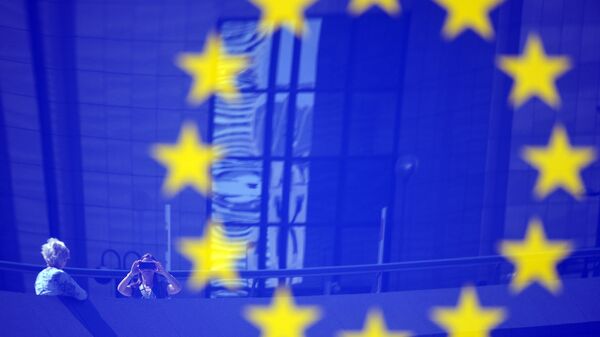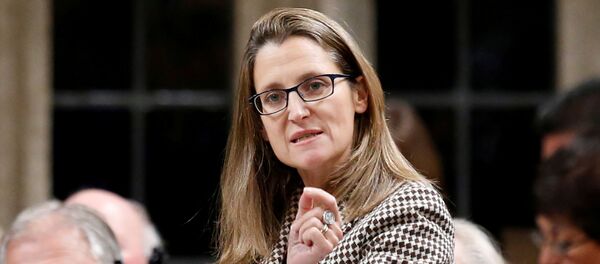Kristian Rouz — EU officials are calling on New Zealand to uphold the "rules-based order" in international trade as Brussels and Wellington engage in Free Trade Agreement (FTA) negotiations. The EU stressed this is of particular importance amidst the expected disruptions in global trade, stemming from Brexit and US President Donald Trump's trade policies.
EU Trade Commissioner Cecilia Malmstrom stressed the system of international trade must maintain a status-quo of open an unrestricted exchange in goods, services, and capital, which is facing major challenges up ahead.
Malmstrom said she was "very worried" of the US decision to impose global tariffs on industrial metals, as well as a separate package of customs duties against $50 billion worth of Chinese trade. She believes such measures could hurt the global economy by disrupting international supply chains.
READ MORE: Germany, France in Quid Pro Quo Deal on EU Budget — Analysts
Malmstrom also stressed an FTA with New Zealand could help the EU offset some of the risks associated with Brexit and the new US trade policies, as the island nation is one of the world's largest exporters of agricultural goods.
"Today is an important milestone in EU-New Zealand relations. Together, we can conclude a win-win agreement that offers benefits to business and citizens alike," Malmstrom said. "This agreement is an excellent opportunity to set ambitious common rules and shape globalization, making trade easier while safeguarding sustainable development. We can lead by example."
Meantime, New Zealand's ruling Labor Party stressed its commitment to "Trade for All," the main principle of Labor's inclusive and progressive trade agenda.
The opposition National Party, however, expressed concern an FTA with the EU could hurt New Zealand's manufacturing sector due to the expected influx of manufactured goods from Europe. However, New Zealand's left-leaning academics have championed the talks.
"We can expect clip-on chapters that promise to help women, indigenous peoples, workers and small and medium enterprises to prosper through trade, alongside cooperation on climate change and sustainability," Professor Jane Kelsey of the University of Auckland said.
Kiwi Minister for Trade and Export Growth David Parker stressed the looming trade deal would deepen and enhance New Zealand's involvement with the European economy, allowing Wellington to alleviate its excessive exposure to the Australian economy, and reduce its reliance on trade with the Asia-Pacific region.
"The EU is one of New Zealand's largest economic partners. We share significant history, culture and values, and yet we currently discriminate against each other on trade. I'm pleased that this anomaly will soon be addressed," Parker stressed.
The Labor cabinet stressed the importance of its progressive agenda of social justice and equality, whilst providing little clarity on the future mechanisms of bilateral trade with the EU. The FTA is expected to remove customs duties and other trade barriers in bilateral economic relations; yet, the Labor government hasn't clearly laid out its rationale for an FTA with the industrial powerhouse of the EU.
"The EU shares our belief in the importance of increased transparency and public consultation around trade negotiations. I encourage all those with an interest to attend one of the upcoming public events, or to make a public submission," Parker said.
Meanwhile, the EU is pushing aggressively for the FTA as it seeks new markets for its industrial exports. And Kiwi Trade Minister Parker's broad authority to engage in the talks, as well as his sympathetic stance on the matter, could produce an FTA quickly — but with questionable outcomes for the Kiwi economy.
"Not even Bill English in John Key's Government, Michael Cullen in Helen Clark's or Bill Birch in Jim Bolger's held such enormous powers across the economy, the environment, foreign policy and the judiciary," Matthew Hooton of New Zealand's lobbying firm Exceltium wrote of Trade Minister Parker.
"In effect, he appoints all new judges, has ministerial responsibility for the Crown Law Office and the Parliamentary Counsel Office and decides whether legislation is compliant with the Bill of Rights Act," Hooton added.
Under the Labor cabinet, New Zealand has become an avid proponent of unrestricted global trade, pushing for a renewal of Trans-Pacific Partnership (TPP) talks with Japan, despite the US withdrawal from the negotiating table.
READ MORE: Century of the Dragon: Key Difference in How US, China Project Economic Power
Additionally, New Zealand has an FTA with mainland China, adding to the brewing concerns of sustainability and prospects of the island nation's own manufacturing sector.


